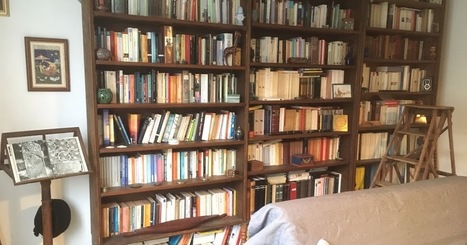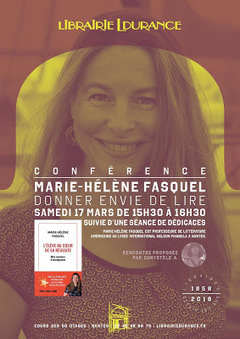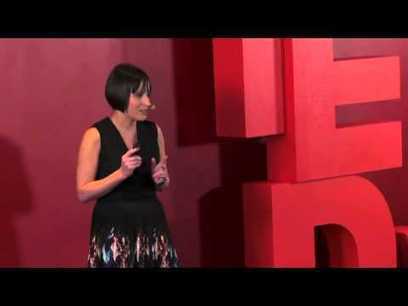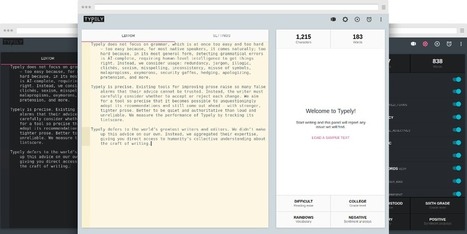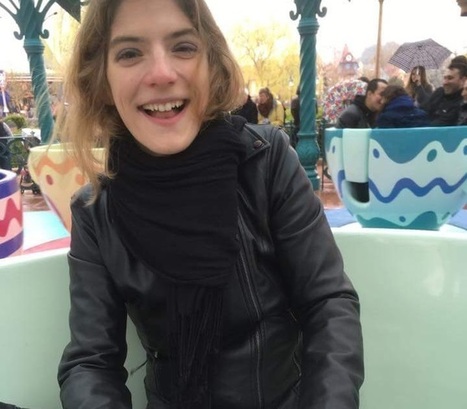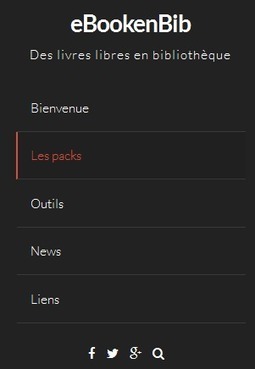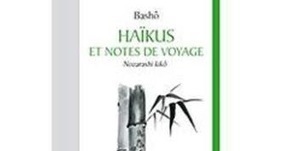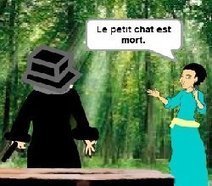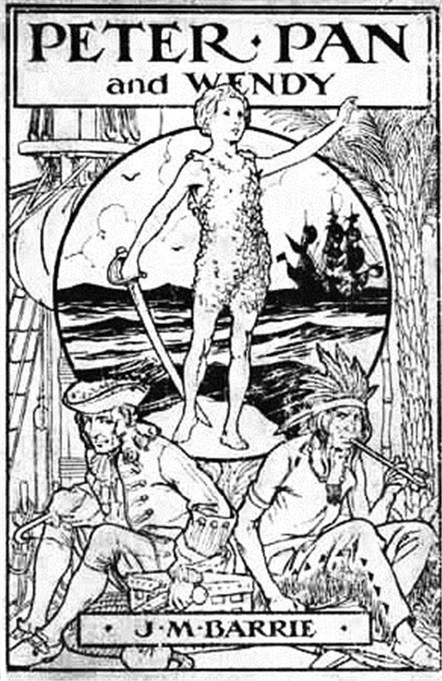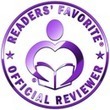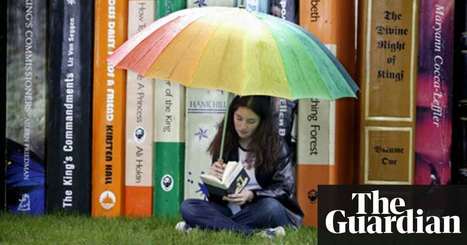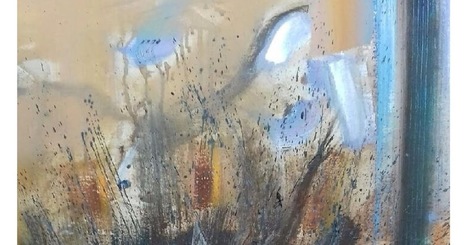 Your new post is loading...
 Your new post is loading...
Blog littéraire de Marie.
Blog littéraire de Marie.
Blog littéraire de Marie.
Typely is a free online proofreading application that helps you write better English
Via Ana Cristina Pratas
Blog littéraire de Marie.
Cet été les prêts de liseuses numériques ont remporté un franc succès.Vous pouvez les emprunter gratuitement, il suffit d'avoir une carte de bibliothèque à jour. Les liseuses sont chargées avec des titres libres de droit dont voici la liste, mais vous pouvez charger ce que vous voulez dessus; à leur retour, nous les réinitialisons. D'ailleurs,…
Blog pour professeurs d'anglais et de langues, pour enseignants intéressés par les TICE.
From the interwar period to the 1950s, children’s literature grew along two axes that look poles apart although they both mirror the anxiety caused by the growing urbanization and the nostalgia for a golden age challenged by the two World Wars. On the one hand, it was the return of fantasy literature. Following in the footsteps of J. M. Barry’s "Peter Pan" (1911), works which have become classics came out, like "Mary Poppins" (1934) by P.L. Travers, "The Hobbit" (1937) by J. P. R. Tolkien or "The Lion, the Witch and the Wardrobe" (1950) by C. S. Lewis – the first of the 7 volumes of "The Chronicles of Narnia". These were often blamed for escapism. On the other hand, it was the advent of stories that were deeply rooted in reality and whose protagonists were resourceful sharp-minded chidren solving enigmas to overcome harships. This trend is best exemplified by Enid Blyton’s novels.
Enid Blyton (1897-1968). A former school teacher, she is one of the biggest best-selling British authors with an international fame. She is especially known for her series "Noddy" (1949-1963), "The Famous Five" (1942-1962) and "The Secret Seven" (1949-1963). August 11th, 2017 would have been her 120th birthday.
In the second half of the 20th century, realism and fantasy were brought together by children’s authors who introduced dystopic elements mirroring the state of the world in the Cold War era. William Golding’s "Lord of the Flies" (1954) was a spearhead. From the 1960s, Roald Dahl followed suit with "James and the Giant Peach"(1961). He tried to satisfy children’s appetite for gluttonry and for all that is a little violent and disgusting while keeping pride of place to typical elements of children’s literature since Lewis Carroll: humour, invention and imagination.
Roald Dahl (1916-1990). Of Norwegian origin, he was born in Wales. Despite his father’s untimely death and bad memories from the boarding schools he had attended, he spent a happy childhood. He traveled the world very young before becoming a fighter pilot during the 2nd World War. In the 1960s, he started writing novels after bedtime stories he invented for his five children. Charlie and the Chocolate Factory (1964) was his first big success of many. He was convinced that reading helped people preserve the curiosity and imagination inherited from their childhood. He is considered as a towering figure of children’s literature. His works illustrated by Quentin Blake were adapted for the cinema by Tim Burton and Steven Spielberg. In 2005, a national day was instaured on his birth date. On septembre 13th 2016, the centenary of his birth was celebrated.
In 1997, J. K. Rowling’s "Harry Potter and the Philosopher’s Stone" (2) was part of Roald Dahl’s legacy while standing out by its magic elements and its public school setting (3) reminiscent of Enid Blyton’s school novels. It immediately ranked on the list of best selling books of all times, propelling children’s literature into a new era.
Under the influence of the Harry Potter saga (1997-2007), children’s novels of the early 20th century have grown longer – they have doubled in size in 40 years according to American magazine Booklist – and they often come in series whose success often relayed by the film industry has not failed. Philip Pullman’s "Dark Materials" (1995-2014) is a best-seller and his work "The Amber Spyglass" was the first children’s novel to be awarded the Whitbread Prize.
British youth literature is visible and in full bloom. Authors of fantasy literature – whose readership has enlarged to young adults – rub shoulders with realistic fiction authors like Jacqueline Wilson or Michael Morpurgo – to name just a few who deal specifically with children’s concerns. Libraries’s youth departments now offer a plethora of books whose variety and attrativity have nothing to do with its early scarcity and narrow-mindedness they used to display.
(1) To know more on the influence of this book in the English-speaking world, you can read the post The Origins of Baseball on English for Schools.
(2) Please check the post Who’s who - Harry Potter on English for Schools.
(3) Please check the post Celebrating back-to-school on English for Schools.
To go further:
Get inspired by the project supported by Café pédagogique on Charlie and the Chocolate Factory!
Read the programme of Bath Children Literature Festival taking place between September 29th and October 8th, 2017.
Don’t forget the International Children’s Book Day in early April!
|
Blog littéraire de Marie.
Blog littéraire de Marie.
Typely is a free online proofreading application that helps you write better English
Via Nik Peachey
How do I write a book review?
Want to write a great book review? Two of the Guardian's top children's book reviewers, Philip Ardagh and Linda Buckley-Archer, share their expert tips to help you get started
Philip Ardagh, Linda Buckley-Archer
Thu 26 May 2011 16.10 BST
First published on Thu 26 May 2011 16.10 BST
Shares
25
A display of oversize books
Philip Ardagh
Roald Dahl funny prize-winner Philip Ardagh is probably best known for his Grubtown Tales series, and for the Eddie Dickens Trilogy. He writes books, and for TV and radio.
Sign up for the Bookmarks email
Read more
1. Do you make notes as you read?
No, I know some reviewers do, but I ain't one of them. I want the reading to be as much like an ordinary reading-for-pleasure experience as possible, and I don't usually read with a pencil and notebook in hand. If there's a page that I think is of particular interest - for, say, characterisation/plot twist/great dialogue/confusion! - I'll bend down the corner of the page... something I'd NEVER do to a book under normal circumstances, I must confess.
When I've finished the book, I'll go back a revisit the dog-eared pages. If it isn't instantly obvious what I turned it down for in the first place, it's probably not worth incorporating into my thinking when writing the review.
2. How much of the review should explain the story and how much be your opinion of it?
I'm a great believer in saying as little as possible about the story itself. I write in broad strokes. I'm more interested in mentioning the themes tackled in a book rather than the specifics. It's usually themes which attract readers, and the details - and the skill in which the author tells it - that keeps them reading. Of course, I offer opinions but reviews are NOT the place to put forward your pet hates. If you don't like the themes or genre, you probably shouldn't be reviewing the book or, if you HAVE to review it for some reason, you role is to decide whether the author achieved what they set out to do and whether their goals were interesting ones.
3. What about spoilers (giving away crucial bits of plot)?
Avoid them at all costs. If it's the lynchpin to the whole plot, NEVER tell. If it's a little bit of a spoiler, treat it as I did in a recent Guardian review:
"My job of reviewing When You Reach Me would be almost impossible without giving certain aspects away, though. So if you don't want to know more – for fear of spoiling it – other than that it's a well-written and engaging read (for which the author, Rebecca Stead, has been garlanded with numerous awards in her native US, including the coveted Newbery Medal), then stop HERE. The rest of you, come with me..."
4. Do you try to read other books by the same author?
Sometimes that can be REALLY useful!
5. What if you really don't like the book at all?
Ask yourself why you're reviewing it. I get to review books for the Guardian in a variety of different ways. For example, I might be asked by the paper if I'd like to review a particular book, or I might have read an advance copy of a book sent to me by a publisher which I'd then ask the paper if I could review.
In the case of a book I want to review, it's going to be what I consider a good one, which appeals to me. In the case of the paper asking me, I might say, "I'm not a big fan of their writing," for example. "How about something else?" Such a small amount of space is given over to reviewing children's books in newspapers - which is why this website, and those like it, are such a FABULOUS idea - why waste what little space you do have with dissing a book you don't like, when you could be reviewing one you'd like people to rush out and try for themselves.
That's not to say that all parts of all of my reviews are nice, nice, nice. I might say that I really enjoyed the plot but that not all the characters were believable, for example, Or that the dialogue was a bit creaky in places...
6. What must you include, if anything? The age group?
Honest opinions. Don't write what you think you should write about a book. Write what you really think and feel.
Have fun!
Linda Buckley-Archer
Linda Buckley-Archer's Time Quake, final installment of The Time Quake Trilogy, is now out in paperback, published by Simon & Schuster.
1. Is there a set way to write a review?
No. It's great that you want to try your hand at reviewing. The important thing is that you express what you think about the book. In case you want some help getting started this Q&A offers some suggestions.
2. So, you've read the book - what's the next step?
Make sure the book is fresh in your mind. If it has been a while since you read it, perhaps it might be a good idea to re-read it. It is amazing how knowing that you are going to write a review makes you focus on the story.
3. Do you make notes as you read?
I do. I use a folded-up piece of paper which I use as a bookmark and scribble on it when something strikes me while I'm reading. This is usually when I think something is great or I think something is annoying. It's a mass of illegible writing by the end with bits underlined and circled and asterisked. I think it is very important to ask yourself questions as you read. If you find you can't turn the pages fast enough, why is that? Is the story dragging for you? Why is that? I also note down quotes that really sum up the book.
4. How much of the review should explain the story and how much be your opinion of it?
I think it is your duty as a book reviewer to describe the kind of story it is well enough for readers to be able to say "Yes, I might give that one a go" or "No, I would not touch that one with a barge pole." But a review is not just about the story it is about your reaction to it. So be sure that you say how you feel about the story, too.
5. What about spoilers?
I would never, ever include spoilers in a review. I don't think it is fair to give out information that would 'spoil' the reader's enjoyment of the story. I suspect the author might be a little cross, too!
6. Do you try to read other books by the same author?
Sometimes, especially if the book is in a series. However, even though it can be interesting to draw comparisons between books by the same author, it is certainly not necessary to read everything an author has ever written in order to make comments about a particular book.
7. What if you really don't like the book at all?
I suspect that if you didn't like the book at all you probably would not have got to the end of it. If you finished the book and didn't like it but still want to write a review then it is important to say why. Was the book just not to your taste or did you identify faults in the story?
8. What must you include, if anything? The age group?
The only pieces of information you must absolutely give are the title of the book and the author's name. Lots of books appeal to a wide age-range. However, if you think it would be useful to say that a book is aimed at younger/ older readers, go ahead.
9. Do you write your review straight away or do you allow your thoughts to develop?
Writing reviews is like baking bread. You add the yeast to the flour and let the dough rise. Then you give it a jolly good kneading and let it rise some more and only then do you bake it. Personally, I leave at least a day between finishing the book and starting the review. Then, once I've written it, I have to leave it another day and look at what I've written with fresh eyes. I always want to change something – make something clearer, tighten it up, add something...
10. Do you tend to review the same kind of books or do you explore genres you would not normally read?
Sometimes I review books that I would not normally read. I never regret it. It is always fascinating to dip your toe in new waters.
11. Do you think about the reader of the review while you are writing it?
Yes. I think it is helpful to remind yourself that you have an audience and that your audience has needs.
12. Are there any benefits of writing reviews for the reviewer?
Writing reviews is a terrific way to sharpen your reading skills and it can introduce you to writers whose books you might not have tried otherwise. The more you know about how books work - how words on a page can create worlds and change your life - the more you'll get out of the whole experience. Last, but not least, learning how to get across your views to someone else is empowering and very satisfying.
Good luck!
Blog littéraire de Marie.
Blog littéraire de Marie.
Chronique de La Bhagavad-Gita (Synchronique Editions).
Blog littéraire de Marie.
Blog littéraire de Marie.
|
 Your new post is loading...
Your new post is loading...
 Your new post is loading...
Your new post is loading...







